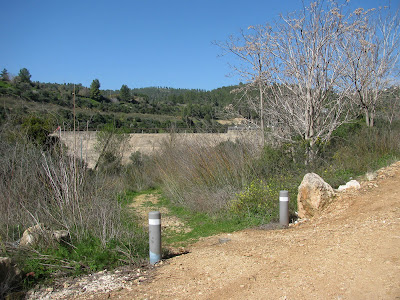Our first hike after Israel's third lockdown started in Ein Kerem, a beautiful
village in the southwest of Jerusalem. The name of the village means "Spring of
the Vineyard". It is surrounded by natural groves and the breathtaking landscape
of the Jerusalem Hills. Christian tradition holds that Saint
John the Baptist
was born in Ein Kerem and the village is a pilgrimage site for many Christian
visitors. There area number of active churches and monasteries in the village,
as well as restaurants, galleries and artisan shops.
We have visited Ein Kerem many time over the years. I
blogged about it
back in 2013. On this occasion we simply began our hike in the village, soon
finding our way onto the Israel Trail via a set of steps known as
Madragot Gan Eden (The Garden of Eden Stairway). At the bottom we took
a break in the Ein Kerem Community Garden for breakfast before continuing on with our
hike through the Ein Kerem national park, following the route of Nahal Ein
Kerem (
nahal is Hebrew for "stream").
January to March is the season of the beautiful wild anemone, called
Calanit in Hebrew, and of the almond tree, Shaked, the first
of the fruit trees in Israel to wake from their winter sleep. These
particular flowers and trees were in full bloom as we made our way down
along our route. They were a welcome reminder that spring is just around the
corner. Centuries-old olive trees - among the most ancient in the country - were growing on the agricultural terraces, reflecting devoted care by the local
inhabitants down through the ages. We even spotted a hyena making its way
along the path!
After a short while we reached the bottom of the hill where we turned onto a
new tree lined trail and bike path, towards the Beit Zayit reservoir and
dam.
The Beit Zayit Water Reservoir is a seasonal reservoir that was built in the 1950s for the purpose of storing rainwater so that it seeped into the ground and reached the water reservoir (aquifer) in the coastal area near Tel Aviv. In order to build the reservoir, a dam, above, was built to prevent the Sorek Stream from flowing through Jerusalem.
After the construction was completed and water was stored in the reservoir, the engineers discovered that the water was indeed seeping, but the wrong way! Instead of flowing to the reservoir in the coastal area, the water was seeping into the springs in the Judean Desert, in the east of Israel, and not accumulating properly.
Despite the engineering and hydrological failure, it was decided not to destroy the dam and the reservoir but to leave it as a tourist attraction. It is now a pretty picnic spot and a great place to hang out for a relaxing afternoon.
We found a gap in the fence around the reservoir where we were able to get closer to the water's edge (most of the area is fenced off). One side of the reservoir is lined with trees, while the side we found ourselves on was grassy. In quieter times the reservoir is a great place for birdwatching. Mallards, sandpipers, coots, moorhens and grebes can all be found there.
After a short while we backtracked along the bike path then turned left, up into the hills, past farmland and the neighbourhood of Beit Zayit, a moshav which was established in 1949 by Jewish immigrants from Egypt, Romania and Yugoslavia. The moshav's economy was once based on fruit orchards, vegetables, poultry and other farm products. Nowadays Beit Zayit is a trendy alternative to living in Jerusalem.
Turning right, we then picked up a green trail, returning to Ein Kerem on
Shvil HaHaruv ("The Carob Trail"). We walked along a rocky pathway, under the shade of pine trees and passing clumps of
Rakefot (
Persian cyclamen).
Rakefot bloom throughout late winter and into spring and it was truly delightful to see so many of these delicate pale pink flowers during our hike.
After a while we were treated to a wonderful view of Ein Kerem and the terraces just beyond. We turned onto a black marked trail, which brought us back into the village and to our car.
It had been a beautiful hike and the perfect way to enjoy the outdoors once again, after being in lockdown for so many weeks previously.














































































